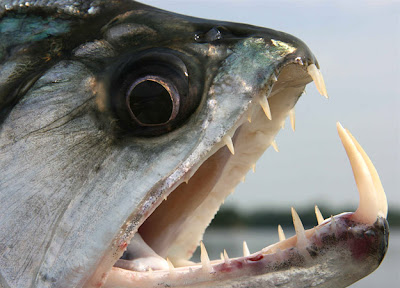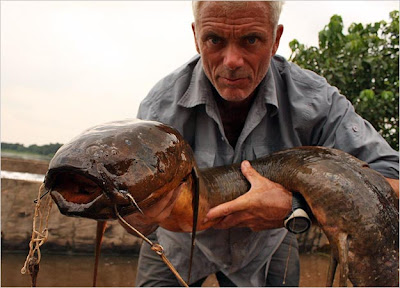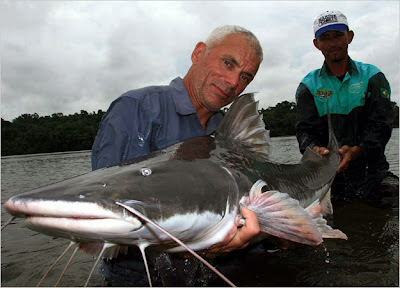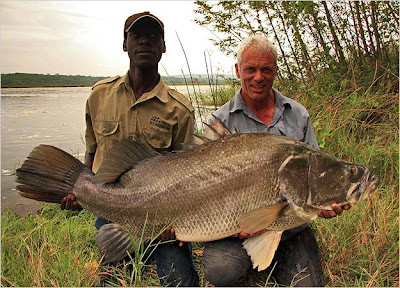River is home to some of the millions of fresh-water type of animals – not to mention its body is being lurk by the creepiest river monsters day and night. These type of monsters are like the ones your mom used to scare you when you’re just a kid. Creatures straight from your nightmare, actually.
A close relative of the piranha, the payara is often called the “vampire fish” because of its long fangs, which can grow to 6 inches in length. This little-known but frightening-looking fish is found in the Orinoco River in Venezuela.

When your name is “Goliath,” you’d better be one humongous, ferocious creature, and the goliath tigerfish definitely lives up to its moniker. A native of the Congo River basin, the Lualaba River, Lake Upemba and Lake Tanganyika in Africa, it’s the largest member of the tigerfish clan, a genus of fierce predators with protruding, daggerlike teeth. The biggest one on record was nearly 5 feet long and weighed 154 pounds, the equivalent of a super-welterweight prizefighter. And it outclasses other African game fish in speed and power.

Not a pretty fish, the African lungfish is a harmless but truly frightening-looking river monster. The largest specimens can reach about 6.6 feet in length. African lungfish are periodically exposed to water with low oxygen content or situations in which their aquatic environment dries up. Their adaptation for dealing with these conditions is an outpocketing of the gut that serves as a lung.

Jeremy Wade holds a 72-pound, 5-foot-long piraiba catfish. These formidable fish can grow to over 10 feet in length and 600 pounds in weight. This powerful fish can drown a wrestling fisherman by dragging him to the bottom of the river. One story tells of a fisherman diving down to untangle a fishing net and vanishing, only to reappear hours later over halfway down the gullet of a giant piraiba.

The Nile perch is considered one of the world’s 100 worst invasive species, though Jeremy caught this one in its native habitat. This species can grow to 6 feet in length and weigh over 500 pounds. This river monster has caused catastrophic declines among native fish populations in areas where it’s been introduced.

Vampire Piranha
A close relative of the piranha, the payara is often called the “vampire fish” because of its long fangs, which can grow to 6 inches in length. This little-known but frightening-looking fish is found in the Orinoco River in Venezuela.

Goliath Tigerfish
When your name is “Goliath,” you’d better be one humongous, ferocious creature, and the goliath tigerfish definitely lives up to its moniker. A native of the Congo River basin, the Lualaba River, Lake Upemba and Lake Tanganyika in Africa, it’s the largest member of the tigerfish clan, a genus of fierce predators with protruding, daggerlike teeth. The biggest one on record was nearly 5 feet long and weighed 154 pounds, the equivalent of a super-welterweight prizefighter. And it outclasses other African game fish in speed and power.

African lungfish
Not a pretty fish, the African lungfish is a harmless but truly frightening-looking river monster. The largest specimens can reach about 6.6 feet in length. African lungfish are periodically exposed to water with low oxygen content or situations in which their aquatic environment dries up. Their adaptation for dealing with these conditions is an outpocketing of the gut that serves as a lung.

Piraiba Catfish
Jeremy Wade holds a 72-pound, 5-foot-long piraiba catfish. These formidable fish can grow to over 10 feet in length and 600 pounds in weight. This powerful fish can drown a wrestling fisherman by dragging him to the bottom of the river. One story tells of a fisherman diving down to untangle a fishing net and vanishing, only to reappear hours later over halfway down the gullet of a giant piraiba.

Nile Perch
The Nile perch is considered one of the world’s 100 worst invasive species, though Jeremy caught this one in its native habitat. This species can grow to 6 feet in length and weigh over 500 pounds. This river monster has caused catastrophic declines among native fish populations in areas where it’s been introduced.









